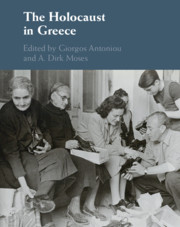Book contents
- The Holocaust in Greece
- The Holocaust in Greece
- Copyright page
- Contents
- Figures and Maps
- Tables
- Contributors
- Preface
- Introduction: The Holocaust in Greece
- I Perpetrators
- 1 The German Occupation and the Holocaust in Greece: A Survey
- 2 “The Bulgarians Were the Worst!” Reconsidering the Holocaust in Salonika within a Regional History of Mass Violence
- 3 The Deportation of the Jews of Rhodes, 1944: An Integrated History
- II Collaborators and Victims
- III The Question of Property
- IV The Aftermath: Survival, Restitution, Memory
- Epilogue
- Index
2 - “The Bulgarians Were the Worst!” Reconsidering the Holocaust in Salonika within a Regional History of Mass Violence
from I - Perpetrators
Published online by Cambridge University Press: 26 October 2018
- The Holocaust in Greece
- The Holocaust in Greece
- Copyright page
- Contents
- Figures and Maps
- Tables
- Contributors
- Preface
- Introduction: The Holocaust in Greece
- I Perpetrators
- 1 The German Occupation and the Holocaust in Greece: A Survey
- 2 “The Bulgarians Were the Worst!” Reconsidering the Holocaust in Salonika within a Regional History of Mass Violence
- 3 The Deportation of the Jews of Rhodes, 1944: An Integrated History
- II Collaborators and Victims
- III The Question of Property
- IV The Aftermath: Survival, Restitution, Memory
- Epilogue
- Index
Summary
- Type
- Chapter
- Information
- The Holocaust in Greece , pp. 36 - 57Publisher: Cambridge University PressPrint publication year: 2018

